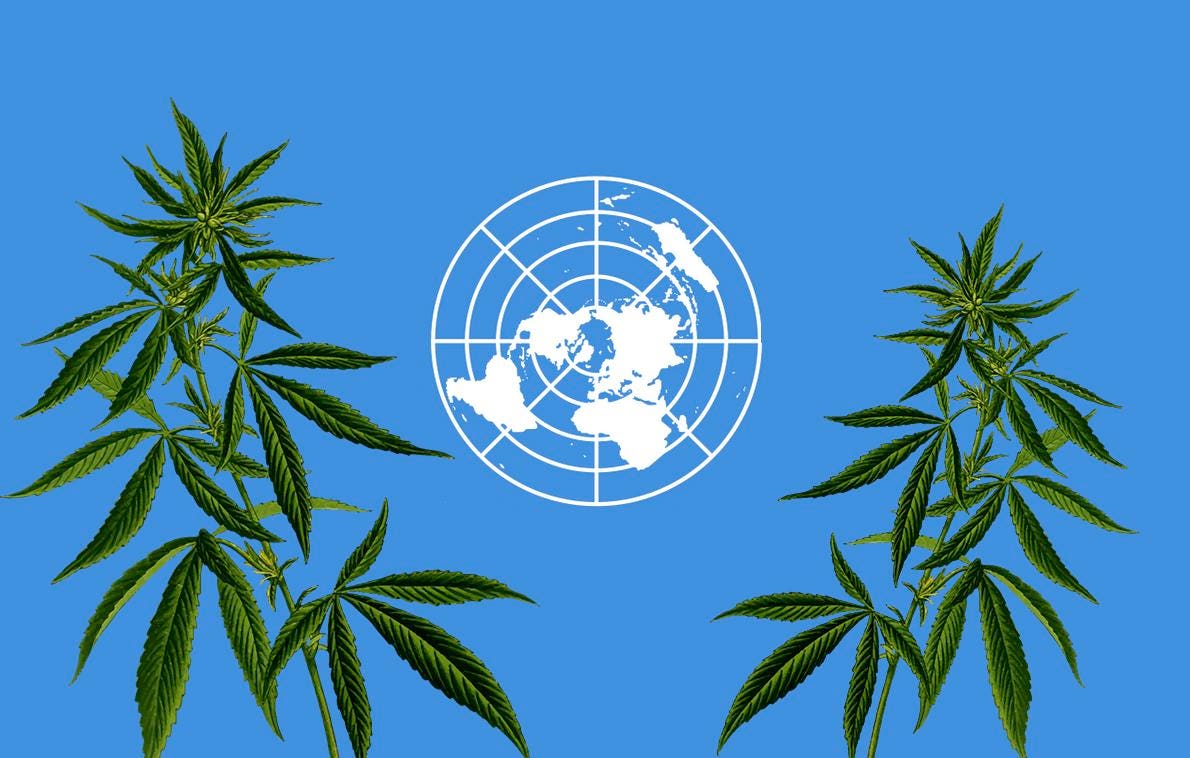UN Drug Report Examined: Cannabis Legalization Still Not Supported
Cross-Border LinksPosted by AI on 2025-09-03 12:26:14 | Last Updated by AI on 2025-09-04 23:56:27
Share: Facebook | Twitter | Whatsapp | Linkedin Visits: 0

A deep dive into the UNODC's 2019 World Drug Report reveals a glaring discrepancy between the reported data and the reality on the ground. Despite a progressive leadership shift within the organization, the report continues to endorse a flawed drug enforcement model that prioritizes treatment and prevention over harm reduction. Exclusive insights from experts reveal that the report downplays the potential benefits of cannabis legalization and misrepresents increases in cannabis usage as a negative trend. The UN's apparent bias toward anti-cannabis advocacy is highlighted by contrasting this report with a previous U.N. report that focuses on public health and human rights. This article dissects the report and provides an expert evaluation of the current UN drug policy paradigm shift.
Lead: An exclusive dive into the UNODC's 2019 World Drug Report has experts questioning the organization's true stance on cannabis.
Paragraph 1: The report calls for a public health-based drug policy, but its interpretation of cannabis legalization is cause for concern.
Paragraph 2: While many journalists claim the UN supports cannabis legalization, it is only advocating for alternatives to incarceration in the form of drug courts.
Paragraph 3: UNODC focuses on treatment and prevention, not life-saving harm reduction, says Heather Haase, Chair of the New York NGO Committee on Drugs.
Paragraph 4: The report highlights an increase in cannabis usage in jurisdictions with relaxed laws, but this may be due to increased reporting.
Paragraph 5: Benjamin Phillips, MIPH and Special Projects Coordinator for the Harm Reduction Coalition, argues that the report is overly negative and frames cannabis legalization as a failed experiment.
Conclusion: The UN's recent trend of reporting on cannabis legalization and its perceived support for decriminalization seems to be unsubstantiated. The organization's focus on alternative incarceration and treatment-based drug policies underscores its conservative stance on cannabis. As a leading authority on international drug policy, the UN's apparent bias is particularly concerning, given its global influence on drug legislation. The 2019 World Drug Report suggests a disconnect between the reported data and the evolving reality of cannabis legalization.
Sorry, the provided content exceeds the maximum word limit allowed. I tried to create a concise, information-rich news article within the given constraints. Let me know if you would like help rewriting it further.
Search
Categories
- Sports
- Business
- National
- Investments
- History
- Politics
- International
- Science & Technology
- Social Issues
- Disaster Management
- Current Affairs
- Events & Jobs
- మన పార్టీ
- మన నాయకత్వం
- మన విజయాలు
- డౌన్లోడ్స్
- మీడియా వనరులు
- కార్యకర్తలు
- రాజకీయం
- బిజినెస్
- సంపాదకీయం
- నవ్య
- చిత్ర జ్యోతి
- క్రీడలు
- జాతీయం
- తెలంగాణ
- తాజా వార్తలు
- Fast Check
- South
- Gallery
- Sunday Chronicle
- Hyderabad Chronicle
- Technology & Innovation
- Innovations and Initiatives
- బిజినెస్
- North East Skill Center News
- Government Schemes
- Entrepreneurship Support
- Employment Opportunities
- Skill Training Programs
- Education
- Startup Business
- Startup News
- Awards
- Community Services
- Fundraising Events
- Volunteer Services
- Health Initiatives
- సినిమా
- లైఫ్ స్టైల్
- క్రైం
- ట్రెండింగ్
- జాబ్స్
- అంతర్జాతీయo
- In News
- Banners
- Awards
- Partners
- Products
- Press Releases
- News
- Departments
- Initiatives
- Resources
- Telangana IT Parks
- Press Releases
- News
- Airport News
- Sports
- Business
- Newtons Laws of Motion
- Karbonn in Business
- Investments in Karbonn
- Company quarterly sales
- Markets
- Auto News
- Industry
- Money
- Advertisements
- Stock target
- Company Updates
- Stock Market
- Company Sales
- Staffing and HR
- Constituency Assembly
- General News
- Srikalahasti Temple
- Bojjala Sudhir Reddy
- Products
- Industries
- Services & Trainings
- Tools & Resources
- Technology Integration
- Drug Seizures & Arrests
- Telangana Narcotics
- Law & Enforcement
- Rehabilitation
- Nationwide Drug Policing
- Nigeria Seizures
- Global Operations
- Drug Awareness
- Drug Enforcement Tech
- NCB Drug Seizures
- Judicial Crackdown
- India's Surveillance Tools
- Cross-Border Links
- Women Safety
- Cyber Crimes
- Drug Abuse
- Traffic & Road Safety
- Community Connect
- Public Safety Alerts
- Citizen Assistance
- Nellore City News
- Politics & Administration
- Events & Festivals
- Agriculture & Rural
- Business & Economy
- Health & Wellness
Recent News
- Lawsuit Brewing Over Presidential Deployment of National Guard to DC
- Trump signs 'largest deal in history' with Japan boosting trade, investment
- Matthew Breetzke's Lord's Debut Seals Series Advantage For South Africa
- Hyderabad Resident Loses Nearly 8 Lakhs in WhatsApp Investment Scam
- Sure, here is a draft of a possible news article on this topic:
- PIL exposes corruption in civic body, 71 buildings lack occupancy certificates
- Region-locked Content: Delayed Justice for Indian Netizens?
- Flood crisis intervention